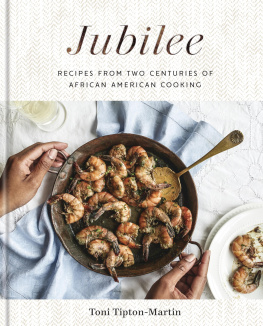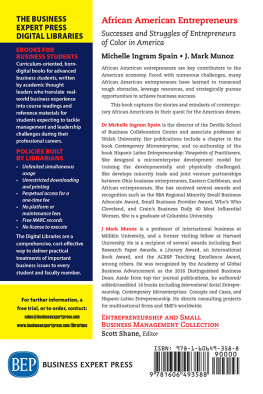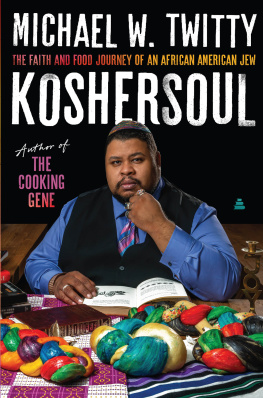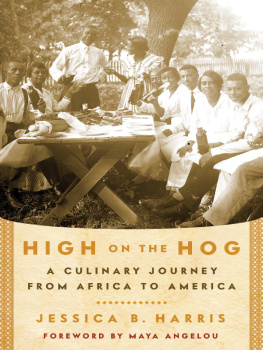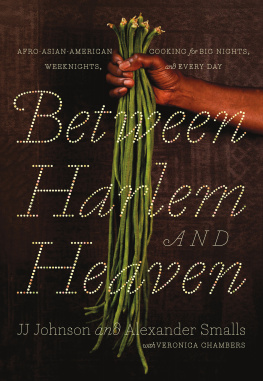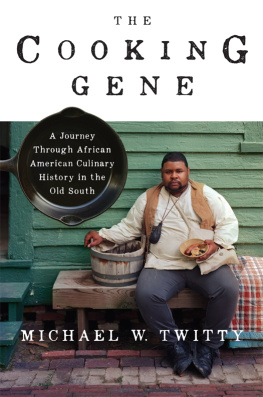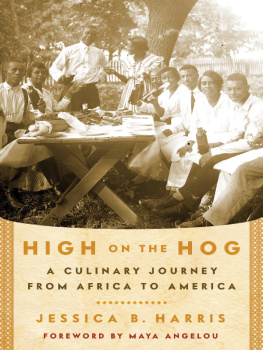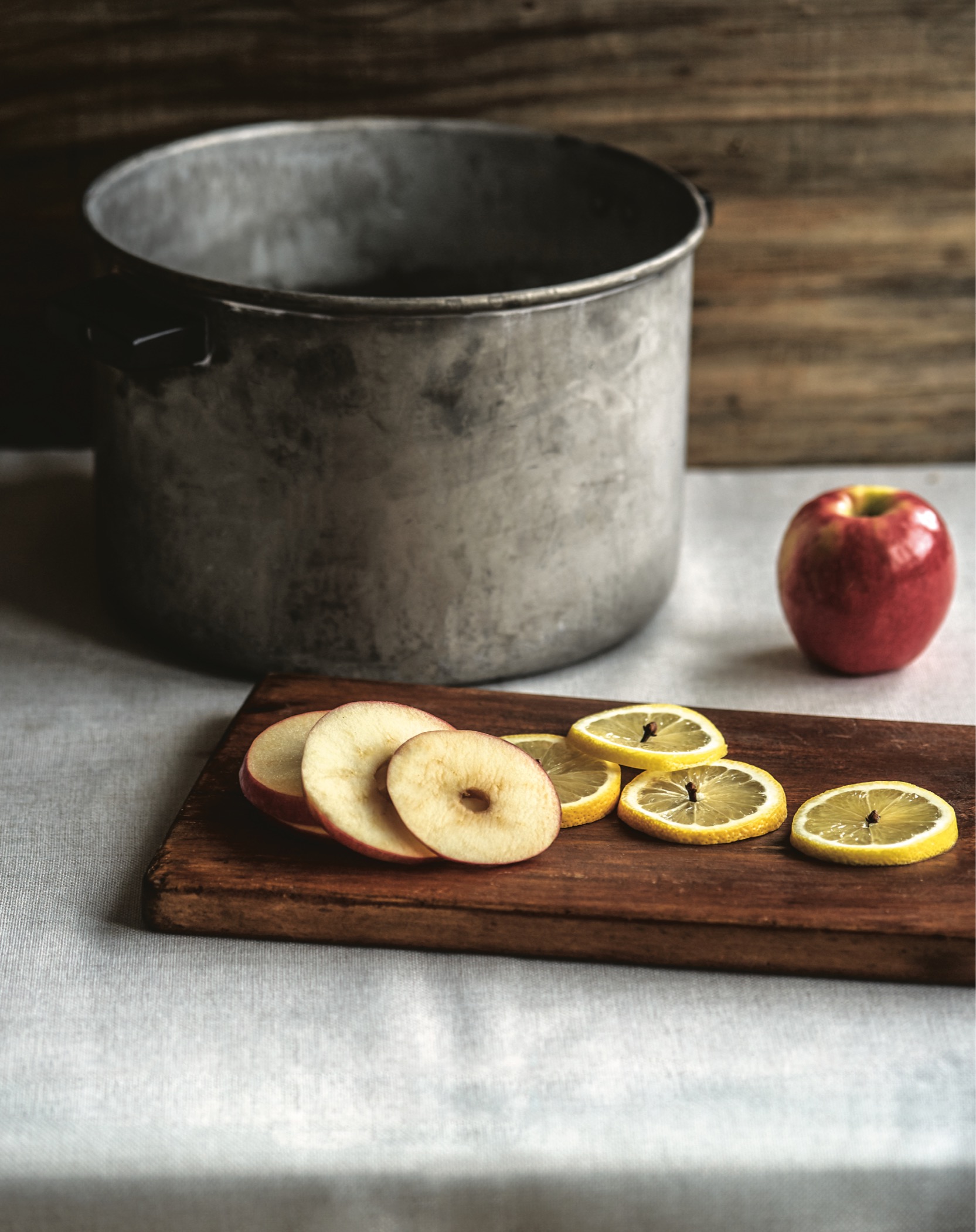Contents
Landmarks
Print Page List
ACKNOWLEDGMENTS
NO STATEMENT OF THE EXCELLENCE OF THE COOKING OF AMERICAN HOMEMAKERS, WHO ARE REPRESENTATIVE OF EVERY RACE OF MANKIND, IS COMPLETE WITHOUT REFERENCE TO THE FINE COOKING OF THE NEGROES OF THE SOUTH, WHO ARE NATURAL GOURMETS. THEY SEEM TO HAVE INHERITED A SORT OF TRADITION OF GOOD COOKING, AND IT MAY BE THAT THIS WILL HAVE A LARGE PLACE IN THE FINAL DEVELOPMENT OF A REAL AMERICAN TYPE OF COOKERY.
LOUIS P. DEGOUY, THE GOLD COOK BOOK, 1947
An adaptation of these words came to mind when I began thinking about how to express my appreciation for all of the blessings and grace extended to me by so many, in a space designed to recognize so few: No expression of appreciation for the assistance, support, and love that went into the making this book is complete without reference to the family members, lifelong and new friends, scholars, artists, and fans of The Jemima Code, who are representative of every race of mankind. They opened their hearts, shared family truths, and nudged this project along, and it may be that this will have a large place in the final appreciation of an expansive story of African American cookery.
To put it another way, it takes a village. And for me, a tribe of incredible women compose most of that village.
Before I get to them, let me say that this book would not have been possible without the pastors, spiritual leaders, and angels who provided me with guidance and comfort, and prayed with and for me through the dark times when insecurity and fear threatened to shut the whole thing down. Thank you for shining your light, Evan Black of Faith for Life Church in Austin; Philip and Sylvia Smith, Marcia and Trellis Stepter, and Denise Materre at Colorado Christian Fellowship; Jeanine Wade, Ana Dove Rodriguez, Jan Triplett, and the diverse women of Bible Study Fellowship, with whom I spent every Wednesday morning for seven years studying to understand my purpose.
I am indebted to everyone who has supported my efforts to reclaim my ancestors reputations. That very long list includes those who bought The Jemima Code (you gave me the confidence and courage to tell my truth); the scholars whose research in Southern, womens, and African American studies schooled me; the chefs who dedicated their restaurants for book signings; the journalists who celebrated The Codes debut with open minds; and so many friends who organized book parties, impromptu lunches, dinners, and happy hours that kept my fun-o-meter set on high, especially: the Hutt and Augustine Families (Heather, Ingrid, Jim, Annice, Hamilton, Harrison, Hugh), Nan Richie, Gina Harris, Joyce Turner, Sharon Gaston, Nikki Stinnette, Sedora Jefferson, Gale Ward, Todd and Joy Shorts, Monica McPherson, Adrienne Mayberry, and Michelle Ball; and I appreciate Wendolyn Washington of Jack and Jill of America; Roxann Chargois and Stacey Bell of the Town Lake Links; Carl Richie, Freddie Dixon, and the men of the Boule, who invited me into these circles of black excellence.
I am grateful for the tribe of women who became family along the way, helping me reconcile the European strands of my heritage: Karin Moss, Kelley Duvarney, Jackie Dielmann, Christy Ross, Luanne Stovall, June Jacobs, Nancie McDermott, Mary Margaret Pack, Lucey Bowen, Marla Camp, Virginia Willis, thank you for exchanging vulnerabilities that prove we are more alike than different. I have been blessed by the encouraging cards, emails, and texts that kept my gaze forward when industry barriers tried to block the way. Thank you, Nathalie Dupree, Ronni Lundy, Marcie Cohen Ferris, Elizabeth Sims, Psyche Williams-Forson, Sandra Gutierrez, Charla Draper, Donna Pierce, Ellen Sweets, and Erika Webber.
Thank you one and all at my stellar literary agency, the Lisa Ekus Group: Lisa and Sally for surrounding me with warmth and love, respecting my vision, and helping me shape it into a proposal, and for your patience and guidance during stressful times; and for your assistance with promoting my work and arranging signings, Jaime Constantine and Sara Pokornyyou rock!
I owe so much to the team at Clarkson Potter for understanding my determination to present a larger vision of African American culinary history, and for going above and beyond to portray this story with such beauty and elegance. You went with the flow when I decided to share my platform as my ancestors had done, by uplifting the next generation of young black female food professionals. Thank you, Doris Cooper, for your expressions of confidence and support; Lydia OBrien, for your administrative assistance; Stephanie Huntwork, for the genius that is evident in your designs; and Francis Lam, my incredible editoryou took a chance on an unconventional idea and then asked the just-right questions that kept me grounded and focused when I was tired and overwhelmed by the scope of this project. You are generous and compassionate. I have been comforted by your wisdom and care.
For the magnificent photographs in this book that made each dish spring from the page, I am eternally grateful to Jerrelle Guy and her partner, Eric Harrison. It took a year to find you, but the ancestors and I are blessed that we finally did. Your images, food styling, and prop choices went far beyond the average portrait to set a table that makes everyone feel welcome. You captured my respect and love for the ancestors and their long tables of hospitality. You are incredible. I also want to thank Pableaux Johnson, the talented and intuitive soul who took my amazing headshots. You sure know how to make a shy girl smile for the camera.
I wish to express my endless love for my familya bunch of eager tasters who asked hard and sometimes annoying questions, forcing me to think through and to defend my opinions. Thank you, Bruce, for your love and encouragement and for never once asking me how much I spent collecting all of these cookbooks; Brandon, Jade, Christian, and Austin, for understanding the absence created between us when I answered the call to take up this work; Mom, for your organizational skills, helping me manage hundreds of notes and recipes and allowing me to make a mess testing recipes in your kitchen for nearly a year; and I am indebted to Derrick, my brother, LaTanya, my sister-in-law, and my niece, Aliya, for standing in the hard spaces for me when I was writing or on the road away from home. I also want to thank Margaret Bernstein for sparking three of the most important decisions of my life; without you I might still be writing about missing persons at a small weekly Los Angeles newspaper and I would never have met the love of my life.
Last, but certainly not least, I also must acknowledge and honor the ancestors whom I treasure for their wisdom, faith, and perseverance. When some people looked at you, they saw mere laborers and didnt even call you by your true names; I saw a glorious diaspora of bright stars using hospitality to express their hearts. You reminded me that I descend from a tradition of strong black women who observed beauty in the world around them and nurtured others no matter how limited or how few the resources and opportunities afforded to them. And through this you quieted my anxious spirit, gave me the courage to look back over my forty-year food industry career, and taught me to trust in my own culinary love language. Because of you, new vistas of self-awareness and self-confidence are mine. You have given life to the truism that you cant be what you cant see.
I proudly embrace your bandannas.
APPETIZERS
Food for Company

